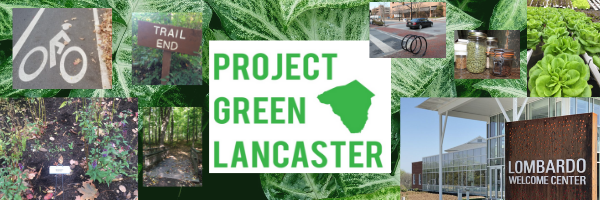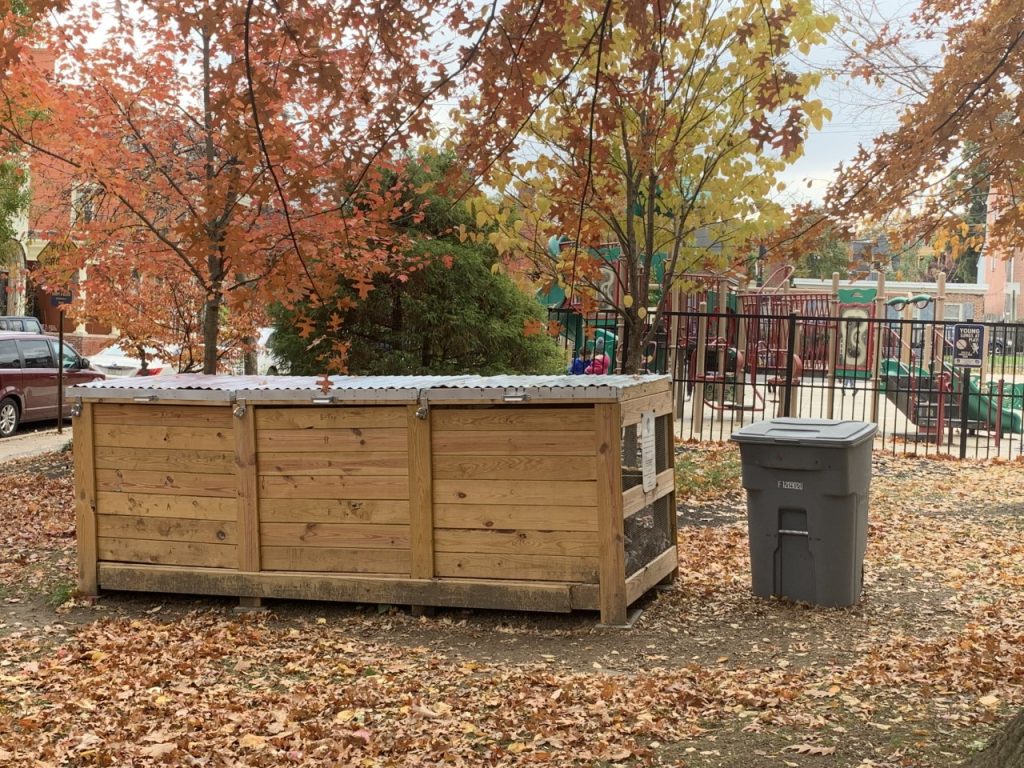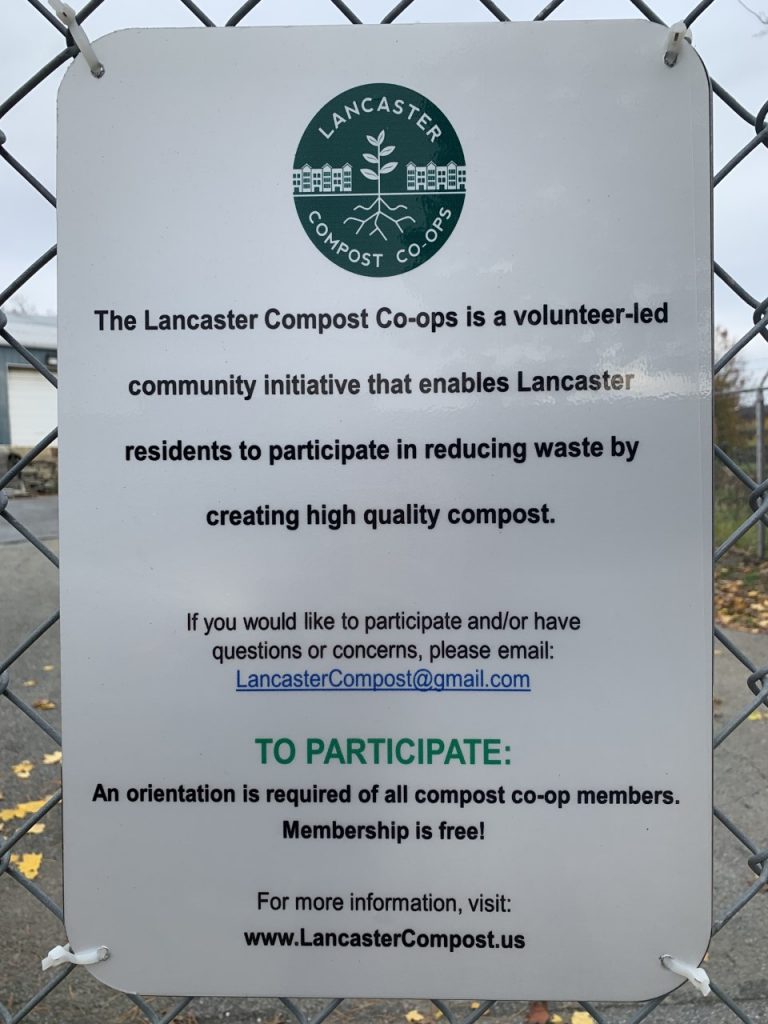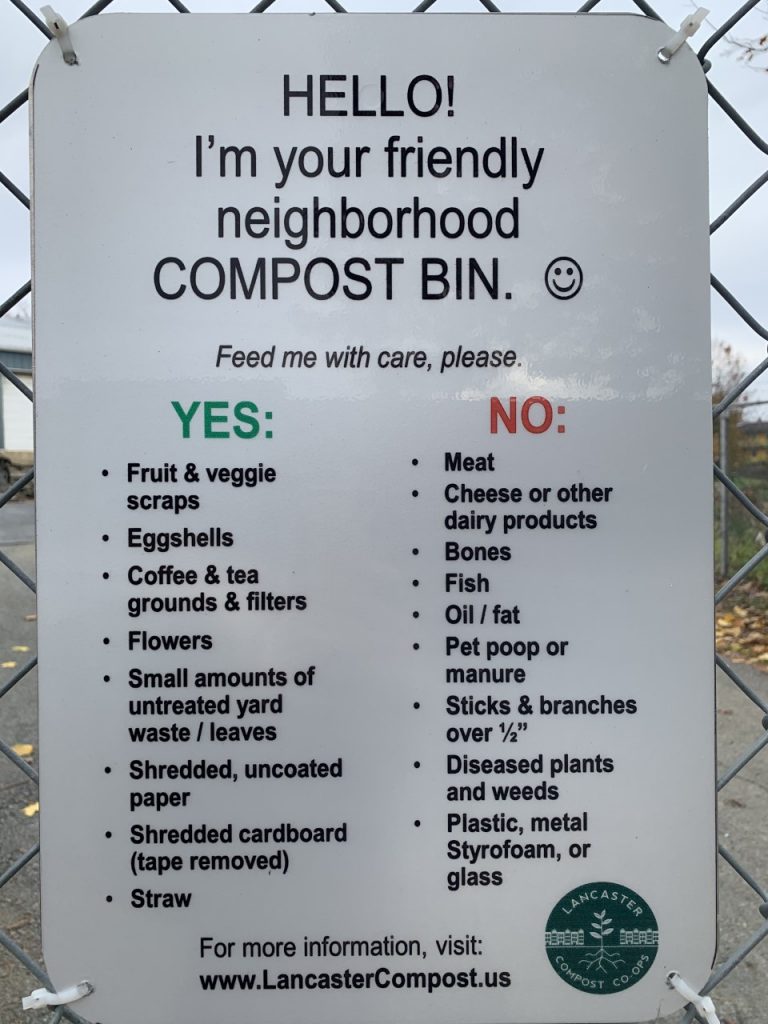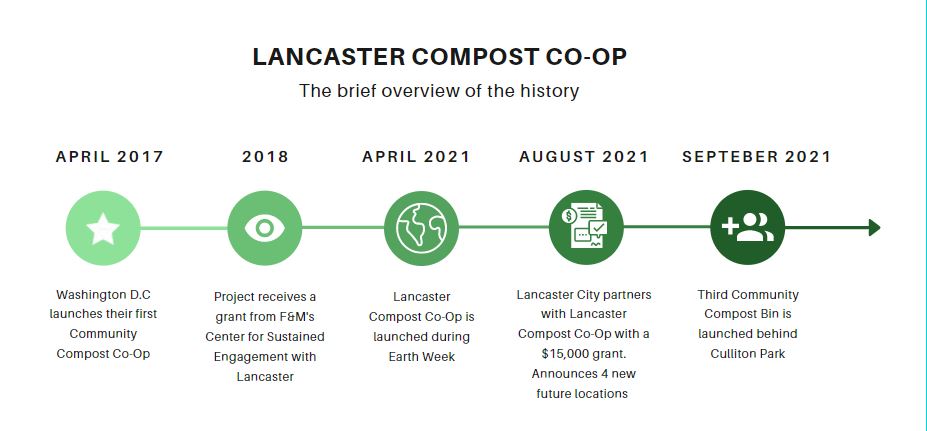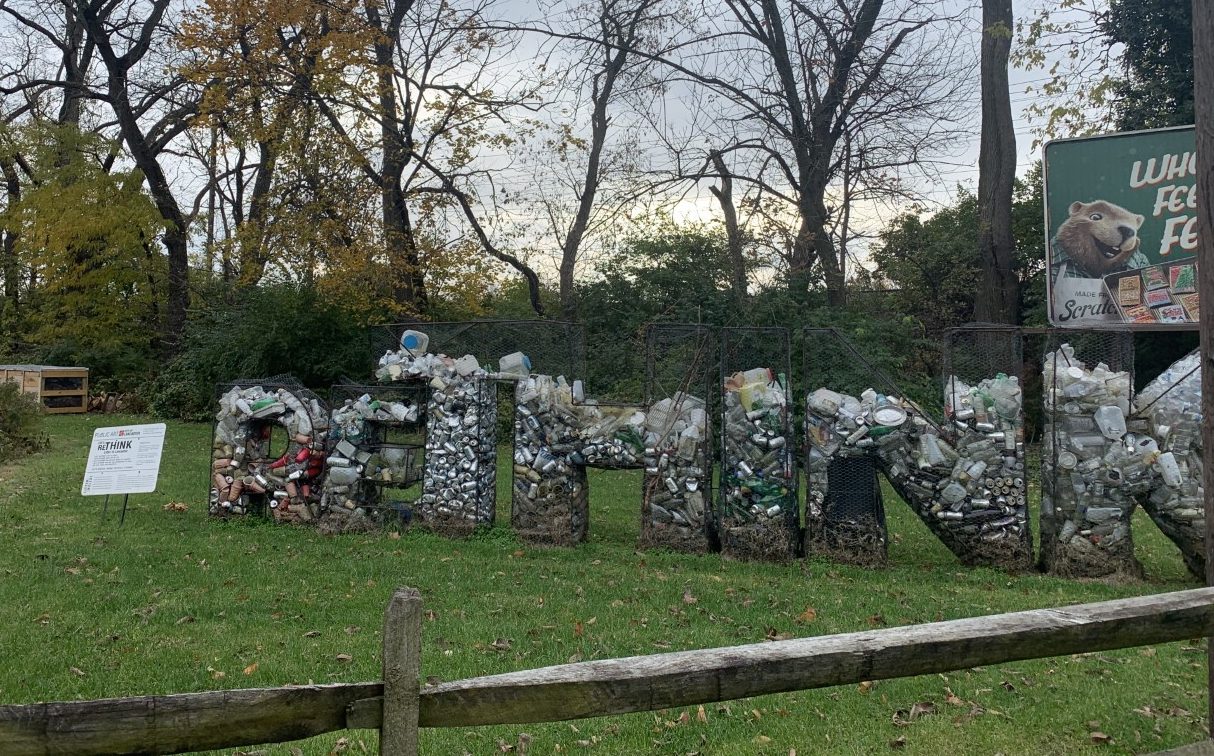By Mandy Weaver
Lancaster Compost Co-Op Makes Composting in the City Practical and Accessible for Residents with Community Compost Bins.
City residents enjoy a fast-paced lifestyle with unlimited opportunities. There are many great ways to be sustainable in Lancaster, like walking and biking, going to thrift stores, or purchasing locally sourced food. But the lack of space for city residents makes other sustainable tasks more challenging.
“I compost not as much for the product that you get out of it, but rather the bigger purpose behind it,” says Emily Shuler. “I was excited when I heard about the Co-Op, and immediately wanted to get involved,” Shuler, a member of the Musser Park Compost Co-Op site, PR manager at a local agency, and a resident of Lancaster City for 6 years and composted her entire life. Moving into the city didn’t change that habit, regardless of the accessibility to space.
The Lancaster Compost Co-Op
Lancaster Compost Co-Op gives residents easy access to dispose of organic food and materials sustainably. The project strives to connect the community through environmental awareness and creating a sustainable city. One of the easiest ways to do this is by taking organic materials out of landfills.
The Co-Op’s no-cost membership is open to every Lancaster resident. There are only two requirements. First, residents must attend an orientation session to get acquainted with the site, learn what composting is, and learn how to compost. Second, the cooperative asks that each member put in 1 hour each month for maintenance.
Otherwise, members may use the bin whenever it is most convenient for them. Each bin accommodates up to 70 members. The Co-Op keeps a list of acceptable items posted as a reminder for the members. Members may use the compost for personal plants or gardens once it’s ready.
The Co-Op has 3 active bin locations. Lancaster City partnered with the Co-Op after receiving a $15,000 grant, which will aid in the building of 4 new bins for more locations. Five out of 15 neighborhoods have walking access to the bins. The project aims to have bins within walking distance for all Lancaster City’s neighborhoods.
The Community
“It’s amazing to see how the community comes together and how you get to know your neighbors while creating a useful, environment-friendly product,” Shuler adds.
Members meet up on ‘workdays’ for monthly bin maintenance. This is when the bin rotations occur. There are 3-compartments in each bin that allow members to easily rotate when full. This frees up space for more compost and allows the old compost to decompose. Having a community of people adding to the compost pile allows the post to have a wide variety of materials and allows multiple people to care for its needs.
These sessions often attract attention, especially from young children playing within the parks. Their natural curiosity allows the group to share valuable teaching moments with the young generation, and possible future members of the Co-Op.

Blue highlights future Co-Op sites
Map provided by the City Of Lancaster, Edited by Mandy Weaver
Access and Use
Accessibility for city residents plays a large role when deciding where the bins will go. Public properties that have easy terrain and landscape features encourage resident participation in the Co-Op.
The bin’s design keeps the area odor and critter-free, which pleases the community. However, some members express having difficulties due to the weight of the bin’s lid. Mike Devaney, Lancaster’s Solid Waste and Recycling Manager, says that a collapsible leg was added to the inside of the lids for members to use and prop open the lid.
Devaney states that there’s a discussion amongst the Co-Op of the bins undergoing a cosmetic redesign. One idea is adding landscape features and other scenery to the locations. Another possibility includes a collaboration with local artists turning the bins into public art for the community.
History
Lancaster Compost Co-Op launched in April 2021 regarding Earth Day. Eve Bratman, a project leader, and Environmental Studies Professor at Franklin & Marshall College started developing the idea in 2018. Inspiration came from a similar program used by the Washington D.C. Department of Parks and Recreation.

Photo provided by Franklin & Marshall College
Eve Bratman
Bratman’s passion for the natural world has led her to dedicate her time and efforts to helping the environment and improving sustainability efforts. Bratman was conducting a senior seminar for undergraduate students focusing on greenhouse gas emissions and how Lancaster City could make composting more sustainable for local businesses. During the research, many mentioned that what the city really needed was a compost system for residents. This led Bratman to pursue the idea of the Lancaster Compost Co-Op. With the initial $11,000 grant from F&M’s Center of Sustained Engagement with Lancaster, Bratman was able to move forward with the project. Now, Bratman mainly oversees the volunteering and community engagement of the Co-Op.
LCSWMA
Before the cooperative, Lancaster City lacked any kind of compost system for residents but encouraged them to compost on their own. LCSWMA periodically offered compost workshops that taught residents how to compost. But many compostable items still ended up at the Lancaster County Solid Waste Management Authority facility. As compostable items decompose in landfills, methane gas is released into the atmosphere, adding to the average person’s carbon footprint and climate change. Compost bins release less methane and create natural alternatives to chemical fertilizers. The compost workshops are now part of the Co-op’s orientation. Furthermore, the compost bins financially help the city. Over 30,000 pounds of compostable food from homes end up in landfills. The less waste the LCSWMA must pick up, the more money is saved and able to go towards other projects focused on sustainability
Washington D.C.’s Community Compost Co-Op
Washington D.C.’s Department of Public Works Waste Diversion started the push towards public compost bins in 2017. Little effort and research had been put into developing sustainable plans towards eliminating food waste out of D.C.’s garbage system, and they began feeling the pressure from their neighbor cities and other megalopolises. The Office of Waste Diversion spent serious time looking into new and different methods for city composting that would be friendly for the environment and financially feasible. The project started with every ward in D.C. having one accessible compost bin for residents. Today, there are over 50 bins throughout the 8 wards. The community compost bins changed the future of sustainability in cities.
How Other Cities Are Making Composting More Viable for Residents
Many cities are stuck in the position that Lancaster was, trying to encourage city residents to compost their own food waste in the limited spaces of their homes. Also like Lancaster, many cities are realizing that it’s just not possible for their residents. Some cities with the largest populations in the U.S. implemented routine compost item pickup alongside garbage and recycling pickup. Residents pay to have their compostable scraps removed, and then the city sells the compost to farmers and gardeners. The profit from selling the compost is how the city funds the routine pickup. This option makes composting accessible but can be costly to residents and the city, which leads to financial difficulties for smaller cities. Other cities have local businesses that run compost drop-off sites. Residents drop off their compost scraps at the bins for free, and then the local businesses pick up the waste, compost it, and sell it.
References
City of Lancaster Receives $15,000 Healing the Planet Grant. (2021 Aug 19). City of Lancaster Pa. https://www.cityoflancasterpa.com/blog/city-of-lancaster-receives-15000-healing-the-planet-grant/
Community Compost Cooperative Network. (n.d). Department of Parks and Recreation. https://dpr.dc.gov/page/community-compost-cooperative-network
Devaney, Mike. Personal Interview. 18 November 2021
Epler, M. (2009 Sept 22). 10 Steps We Take To Live Sustainably In The City. Simple, Green, Frugal Co-op. https://simple-green-frugal-co-op.blogspot.com/2009/09/10-steps-we-take-to-live-sustainably-in.html
Giangiulio, Amy. Personal Interview. 17 November 2021
Kirkland, N. (Host). (2021, 25 March). Residential Composting Cooperatives in the City of Lancaster (No. 5) [Audio Podcast Episode]. In Franklin & Marshall College’s CSEWL’s Research Spotlight. Listen Notes. https://www.listennotes.com/podcasts/franklin-marshall/episode-5-residential-cYa5NVm-XiU/
Lancaster Compost Co-op. (n.d) https://www.lancastercompost.us/
Neighborhoods Maps. (n.d) City Of Lancaster PA. https://www.cityoflancasterpa.com/wp-content/uploads/2019/08/NeighborhoodsPrint2017Update.pdf
Ritchey, E. (2021 July 6). Residential Compost Co-Op Melds Sustainability. One United Lancaster. https://oneunitedlancaster.com/coronavirus-news-roundup/residential-compost-co-ops-melds-sustainability-community/
Shuler, Emily. Personal Interview. 18 November 2021
